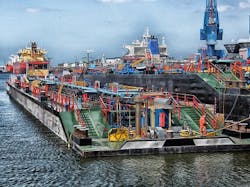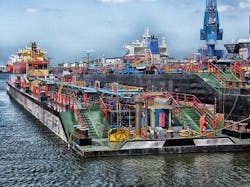LONDON, UK - An amendment has been made for ships to comply with the International Maritime Organization (IMO) ballast water regulations.
A change to the 2004 International Convention for the Control and Management of Ships’ Ballast Water and Sediments was agreed at the IMO Marine Environment Protection Committee (MEPC) meetings held last week in London, England.
The amendment will mean that ships currently in service will have to comply with the D-2 standard of the Convention at their next International Oil Pollution Prevention Certificate renewal (a certificate requiring renewal every five years) following September 8, 2019.
The previously agreed schedule however specified that ships would have to comply immediately after Entry Into Force of the Convention on September 8, 2017.
As a result, newly built ships whose keels are laid after the Convention’s September 8, 2017 Entry Into Force date are still required to be compliant with the D-2 standard upon their delivery.
The D-2 standard requires ballast water management (expected to be achieved principally through the use of Type Approved ballast water treatment system equipment) to restrict to a specified minimum the amount of viable, and potentially invasive organisms, allowed to be discharged.
This approved amendment to the Convention implementation schedule is expected to be finally adopted at the next meeting of the IMO MEPC in April, 2018.
The amendment to the Convention is not expected to impact the implementation schedule of the United States Coast Guard (USCG) ballast water regulations, which currently require vessels that discharge ballast in U.S. waters to either install a treatment system or manage their ballast water in another approved way.
Calgon Carbon said the amendment could “dampen the pace of near-term market development and demand growth for ballast water treatment systems”.
Randy Dearth, CEO of Calgon Carbon, said: “We are disappointed that full compliance with regulations to protect the world’s marine ecosystems have yet again been delayed. Every day, millions of gallons of untreated and potentially harmful ballast water are discharged into ports around the world – even though effective treatment solutions are ready and available.”
It's estimated that tens of thousands of vessels worldwide will require the installation of equipment to meet the requirements of the convention.
Calgon Carbon currently estimates the expected global ballast water management system market size to be approximately $18 billion to $28 billion and to affect approximately 64,000 ships as a result of the IMO Convention and separate USCG ballast water regulations.
###
Read more
Ballast backlash: Is IMO ratification helping or hindering technology?
Evoqua partners Hai Cheung to grow ballast treatment presence in China




